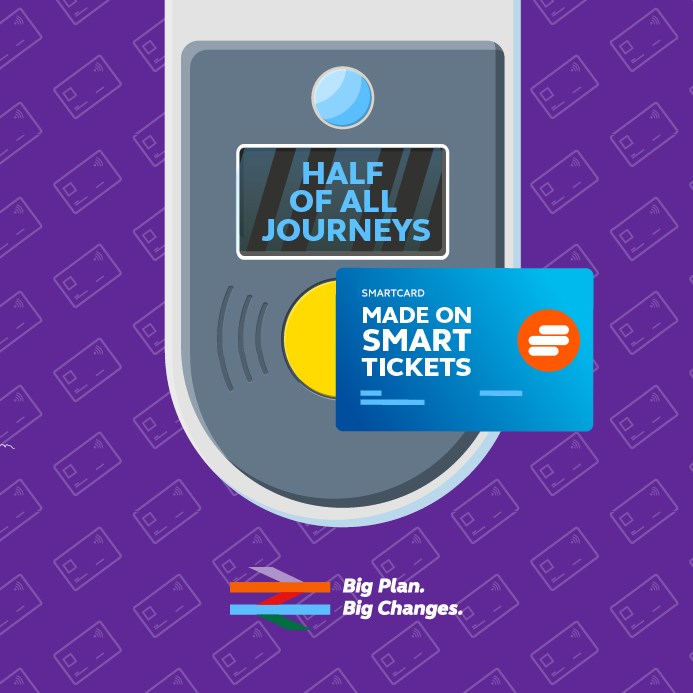
Smart train tickets reach tipping point as paper tapers off
More passengers than ever before are opting for smart tickets, tipping the balance away from paper.
The days of rail passengers clutching handfuls of orange paper tickets are numbered as new figures from the rail industry show that just half of all journeys (50%) are now taken using paper tickets, down from over six in 10 (63%) last year.
The data shows the monthly number of journeys taken with paper tickets dropped by 13.3 million year on year, saving over 1,100km of paper – equal to the distance between London and Barcelona.
The move away from paper follows major upgrades as the rail industry has worked together to improve technology, install and upgrade ticket barriers at stations and promote smart tickets to passengers. This week, train companies are holding ‘Smart Week’ to encourage more people to switch to smart tickets with 134 events throughout the week at over 70 stations across the country where staff will be on hand to help people give them a try.
Smart tickets can be kept securely, save passengers time with no need to queue to buy a ticket and they allow people to book online from anywhere for anyone. Covering both smartcards and barcode tickets on mobile phones, they are also less likely to wear out and stop working than paper tickets.
New rail industry figures show that last month:
- More train journeys than ever before were made with smart tickets, reaching 65 million
- 18.4 million more journeys were made with a smart ticket compared to the same time last year
- Passengers chose smart tickets for half (50%) of all journeys, up significantly from less than four in 10 (37%) one year ago.
Every train operator has worked to provide a smart ticket option and ensure passengers can use smart tickets on nine in 10 routes across the National Rail network. Now, to make the most of new technology, the rail industry wants to work with government to accelerate wholesale reform of outdated fares regulation – sticking plasters for the fares system are not enough.
Full reform would pave the way for pay‐as‐you‐go price caps and part-time, flexi season tickets to be introduced across the country so that commuters could save money when they travel off peak or fewer than five days a week. On long‐distance journeys, it could enable a greater range of on‐the‐day fares for people to buy on their smartphone, giving them more options at a better range of prices.
Robert Nisbet, Director of Nations and Regions at the Rail Delivery Group, said:
“Smart tickets open up the possibility of a host of new types of fares like part-time season tickets or tap-in-tap-out that works across buses, trams and trains. Making the most of the possibilities offered by smart tickets requires root and branch reform of fares regulations and we want to work with government to make it happen.”
Rail Minister Chris Heaton-Harris said:
“Smart tickets are a vital part of making journeys quicker and more convenient for passengers. Working with the rail industry we have rolled out smart options across the country, so that passengers can now get a smart card or a barcode e-ticket for almost all journeys.
“The forthcoming Williams Review White Paper will also provide recommendations to modernise our fares system, bringing the railway in line with what passengers expect in the 21st century.”
The industry is also holding #StationsDay on Tuesday 15 October to celebrate improvements at railway stations which are connecting communities and spearheading economic growth.
Notes to editors
- Train companies are running Smart Week this week (14 - 20 October). Working together, staff will help people make the switch from paper to smartcards and mobile phones, with competitions and giveaways at stations. There will be 134 events at 73 stations across England, including Leicester, London Bridge, Plymouth, Cambridge and Manchester Airport. More information about Smart Week including a full list of stations taking part is available at www.nationalrail.co.uk/smart.
- Rail industry data is taken from a four-week period during August to September 2019 and is compared to the same period in 2018.
- 13.3 million fewer journeys were taken with a paper ticket in August to September 2019 compared to the same period in 2018, saving over 1,100km of paper. This was calculated by multiplying the length of an orange ticket (8.5cm) by the number of paper tickets saved (13,287,349) = 1,129.4km.
- The Rail Delivery Group, train operating companies, Department for Transport, Transport for the North, Transport Scotland and Transport for Wales have all worked together to roll out smart ticketing. This involved upgrading ticket barriers at stations and bringing millions of ticket options for customers on to a shared database, which enables smart ticket transactions to be processed for the whole industry.
- Every train operator has worked to provide a smart ticket option and ensure passengers can use smart tickets on nine in 10 routes across the National Rail network.
- In February, the Rail Delivery Group set out proposals to reform the fares system which, if accepted, will make fares simpler and easier-to-use, enhancing the benefits of smart ticketing. Read about the proposals at: www.bigplanbigchanges.co.uk/easierfares.
